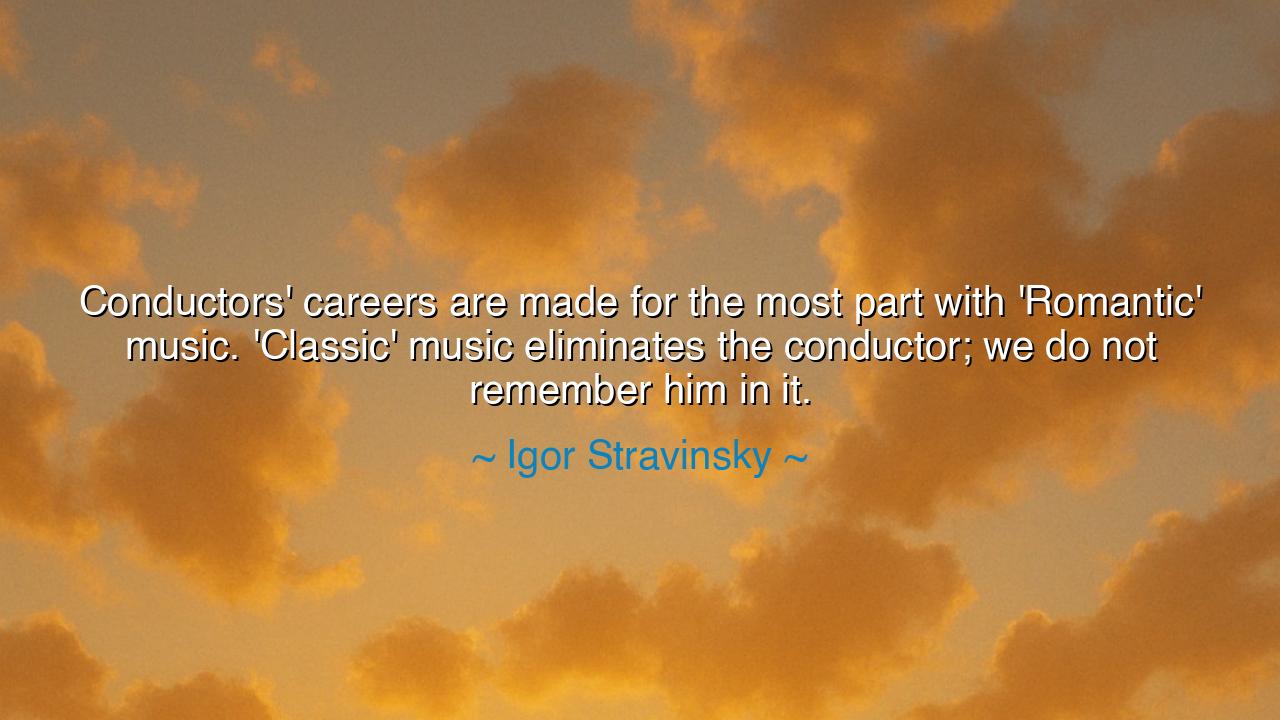
Conductors' careers are made for the most part with 'Romantic'
Conductors' careers are made for the most part with 'Romantic' music. 'Classic' music eliminates the conductor; we do not remember him in it.






Come, my children, gather around and listen well, for the words of Igor Stravinsky offer profound insight into the art of music and the role of the conductor. He said: "Conductors' careers are made for the most part with 'Romantic' music. 'Classic' music eliminates the conductor; we do not remember him in it." In these words, Stravinsky speaks of a deeper truth about the relationship between the conductor, the music, and the way we perceive the power of the artist. Let us explore what this means, for there is wisdom in his understanding of the role of the individual in a world filled with the grandeur of classical music.
In the ancient world, music was not just a form of entertainment, but a sacred medium through which the divine could be touched. The Greeks, in particular, understood music as an expression of the universe's order, a reflection of harmony and balance. Pythagoras, the philosopher and mathematician, discovered the relationship between numbers and musical tones, seeing the world itself as a grand orchestra, where everything from the stars in the sky to the human soul followed a musical rhythm. In this sense, music, like life, was something eternal and immutable—a force beyond the individual. In the same way, Stravinsky suggests that classical music does not belong to the conductor but to the universal harmony itself. It is not the conductor’s individuality that makes the music significant, but the music itself, existing outside the influence of the performer.
The ancient role of the conductor, much like the role of the orator, was to guide others in the expression of a higher truth. In Classical music, we often think of the composer as the true creator of the work, and the conductor's role is one of interpretation, of facilitating the harmony between the performers and the score. But in Romantic music, as Stravinsky points out, the conductor becomes far more visible—a heroic figure whose interpretation and leadership bring out the emotions and passions of the music. The Romantic period, from composers like Beethoven to Tchaikovsky, gave rise to music that was less about intellectual structure and more about feeling and expression. The conductor, in these moments, becomes the embodiment of the music’s spirit, guiding it and infusing it with life. This is where Stravinsky finds the significance of the conductor's role—where the conductor is not just an interpreter but a creator in their own right.
Let us look to the life of Herbert von Karajan, one of the most famous conductors of the 20th century. His career, like many other conductors’, was defined by his work with Romantic composers, where his mastery over the orchestra and his unique interpretation of the music earned him the admiration of millions. His ability to shape the emotional core of the music brought him fame and reverence. But consider, my children, the difference in his relationship with Bach, whose compositions are revered as the epitome of structure and balance. In Bach’s works, the focus is on the intricacy of the music itself, the mathematical precision of the harmony and counterpoint. Here, the conductor is more of a facilitator, a guide, rather than the center of attention. The music, like the cosmos, exists in a state of perfection, and the conductor, though important, does not dominate the experience. Romantic music, on the other hand, with its soaring melodies and emotional depths, is where the conductor's individuality becomes intertwined with the spirit of the music.
This duality in music—between Classical and Romantic—also mirrors the human condition itself. In Classical music, as in life, we are often reminded of the importance of structure, discipline, and the higher principles that govern our actions. The conductor’s role here is to reveal the order and beauty that already exist within the music, to lead but not to dominate. In Romantic music, however, the individual soul is given free reign, and the conductor’s passion and interpretation become an integral part of the work. The conductor becomes both the guide and the emotional channel, bringing out the deeper feelings hidden within the music. This, Stravinsky tells us, is where the conductor’s career is made—the moment when the music is alive with human emotion and the conductor’s presence is felt, not as a servant to the music, but as a co-creator.
So, my children, what lesson can we take from Stravinsky's insight? It is this: the importance of the conductor in Romantic music teaches us about the balance between the individual and the universal. Just as Bach’s music requires the precision of a conductor who understands the structure, the Romantic composers demand a conductor who can express the deep emotions within the music. Stravinsky reminds us that in life, we are not merely spectators in a grand design but active participants in the unfolding of creation. Like the conductor, we are called to both understand the order of the world and to bring our own unique voice to it, to shape the emotion and spirit of the world around us.
Thus, my children, as you journey through life, remember that you too must find balance between the roles of observer and creator. Like the conductor of Romantic music, embrace your individuality, but also understand the greater harmony that binds us all. In everything you do—whether in love, work, or art—seek to find the perfect balance between the structure that guides you and the emotions that inspire you. And when the time comes for you to take the lead, let it be not as one who dominates, but as one who enhances the music of life, guiding others toward a deeper understanding of the beauty and truth within them.






AAdministratorAdministrator
Welcome, honored guests. Please leave a comment, we will respond soon